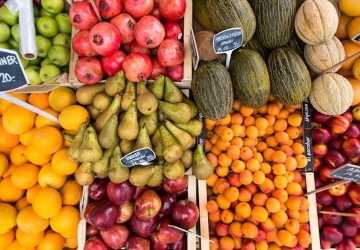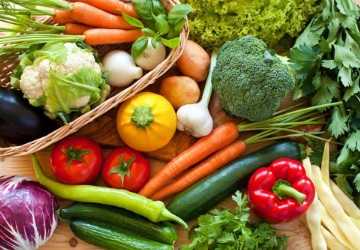Exploring Seasonal Eating Benefits
We change our clothing according to the season, swapping out light fabrics for cozy knits as the temperature dips. We update our home interiors, bringing in warmer tones and textures for winter or pops of color for spring. We even tweak our style with the changing seasons, opting for breezy sundresses in summer and layering chunky scarves in fall. But what if we took this seasonal approach further and considered revamping our plates?
We change our clothing according to the season, swapping out light fabrics for cozy knits as the temperature dips. We update our home interiors, bringing in warmer tones and textures for winter or pops of color for spring. We even tweak our style with the changing seasons, opting for breezy sundresses in summer and layering chunky scarves in fall. But what if we took this seasonal approach further and considered revamping our plates?
Seasonal eating is all about aligning your diet with the natural rhythm of the earth. Imagine incorporating the freshest, most vibrant fruits and vegetables at their peak ripeness. This isn't just a culinary delight – it's a practice packed with hidden health and environmental benefits. Let’s find out the benefits of seasonal eating and how they impact you as well!

The Advantages of Seasonal Eating
Different fruits and vegetables thrive in specific seasons based on temperature, sunlight, and rainfall. Seasonal eating encourages you to enjoy these foods at their peak when nature has nurtured them to their most flavorful and nutritious state.
Let’s find out the benefits of seasonal eating:
1. Taste and Quality
Think of biting into a perfectly ripe strawberry, full of flavor and sweetness that explodes in your mouth. Now, compare that to a supermarket strawberry in December, pale and watery. That's the magic of seasonal eating – fruits and vegetables taste better in season.
Here's why:
· Ripeness at Its Peak
When produce ripens naturally under the perfect combination of sunlight, temperature, and rainfall, it develops its full flavor spectrum. Off-season produce is often picked before peak ripeness to withstand long-distance travel, resulting in a bland, underdeveloped taste.
· Freshness Matters
Seasonal produce travels shorter distances, spending less time in storage and on trucks. This translates to fresher fruits and vegetables, retaining their natural crispness, vibrant colors, and, of course, the explosion of flavor you crave.
2. Health Benefits
When fruits and vegetables ripen naturally under ideal conditions, they develop a higher concentration of vitamins, minerals, and antioxidants. A juicy summer tomato would be packed with lycopene, an antioxidant linked to heart health. Off-season tomatoes, picked before peak ripeness, may have lower levels of lycopene.
· Seasonal Support for Your Immune System
Nature seems to know what we need when we need it. Citrus fruits, abundant in winter, are loaded with vitamin C, vital for a healthy immune system to fight winter colds. Similarly, summer berries, bursting with antioxidants, can help combat inflammation and keep you feeling your best. By opting for sustainable eating habits, you provide your body with the natural ammunition it needs to stay healthy throughout the year.
· Aiding Digestion
Seasonal fruits and vegetables are often higher in fiber, which plays a crucial role in digestion. Think about crisp asparagus in spring, perfect for gut health, or hearty winter squashes, rich in prebiotics that nourish your gut microbiome.
· A Win for Sustainability
We all know the importance of reducing our environmental footprint. Seasonal eating offers a delicious and simple way to create sustainable eating habits and play your part in the environment. Here's how:
· Reduced Reliance on Out-of-Season Produce
Supermarkets often stock fruits and vegetables from all over the world, regardless of the season. This reliance on out-of-season produce necessitates long-distance transportation – trucks, ships, and even airplanes – to get those exotic berries or asparagus in December.
· Transportation's Hidden Cost
Every mile of food transportation translates to increased fuel usage and, consequently, higher carbon emissions. These emissions contribute to climate change, impacting the very environment that sustains us.
· Supporting Local Farmers
Seasonal eating encourages you to source your produce from local farms or farmers' markets. This not only guarantees freshness but also supports local economies and sustainable farming practices. Local farms typically use less energy-intensive methods and have a smaller environmental impact compared to large-scale industrial agriculture.

The environmental benefits of seasonal eating go beyond just carbon emissions. It promotes:
· Reduced Food Waste
Seasonal produce travels shorter distances, minimizing spoilage and food waste. This translates to less food ending up in landfills, where it decomposes and releases methane, a potent greenhouse gas.
· Conservation of Resources
Seasonal eating often encourages less reliance on artificial ripening techniques and refrigeration during transport, both of which require energy consumption.
3. Budget-Friendly Feasts
Let's face it, eating healthy can sometimes hit your wallet hard. But here's the good news: seasonal eating can be a budget-friendly approach to delicious and nutritious meals. Here's why:
· Supply and Demand
When a particular fruit or vegetable is in season, there's an abundance of it available. This increased supply translates to lower prices for consumers. Think about plump tomatoes overflowing at farmers' markets in summer – they're not only at their peak flavor but also significantly more affordable compared to their off-season counterparts.
· Reduced Transportation Costs
Remember how seasonal eating minimizes long-distance transport? This translates to lower costs for farmers and distributors, which ultimately translates to savings for you. Avocados flown in from South America in December will likely cost more than locally grown winter root vegetables.
4. Culinary Creativity Throughout the Year
Gone are the days of monotonous meals! Seasonal eating doesn’t restrict your diet but instead gives you a plethora of fresh produce to incorporate into your culinary creations. Here's how seasonal ingredients spark creativity in the kitchen:
· A Constant Stream of New Flavors
With each season comes a wave of exciting new ingredients. Spring brings tender asparagus and vibrant peas, summer boasts juicy berries and sweet corn, fall offers earthy mushrooms and hearty squashes, and winter delights with citrus fruits and Brussels sprouts. This constant influx of fresh ingredients keeps your meals interesting and prevents culinary boredom.
· Unlocking New Recipes
Seasonal produce naturally inspires new recipes. Summer's bounty of tomatoes calls you to experiment with fresh tomato salads, gazpacho, or a vibrant pasta sauce. Fall's arrival might prompt you to explore the world of pumpkin curries or butternut squash gratins. By embracing what's in season, you'll discover a whole new world of culinary possibilities.
Wrapping Up
Incorporating seasonal eating into your life doesn't have to be complicated. It's simply about aligning your diet with nature's rhythm. By enjoying the freshest seasonal produce taste at its peak, you'll unlock a world of flavor, support local farmers, and give your body the nutrients it craves.





